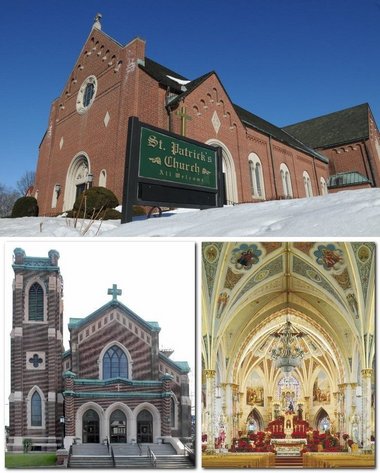By Jeanette DeForge
The Republican
November 11, 2011
http://www.masslive.com/news/index.ssf/2011/11/vatican_upholds_springfield_di.html
 |
| The Vatican's highest court has upheld the decision of the Roman Catholic Diocese of Springfield to close three Western Massachusetts parishes – St. Patrick's (top) and St. George (left) in Chicopee and St. Stanislaus in Adams. |
The Vatican has upheld the decision that bans the Roman Catholic Diocese of Springfield from converting three churches to secular use, but will not require it to hold worship services in them.
Diocesan officials Thursday released a decision by the Apostolic Signatura, or the highest ruling body in the Vatican, that was handed to Bishop Timothy A. McDonnell when he was in Rome on Wednesday.
The decision upheld McDonnell’s right to dissolve the parishes, or the organization of church members, but said he cannot close and deconsecrate St. George and St. Patrick churches in Chicopee and St. Stanislaus Kostka in Adams and sell or otherwise use them for secular purposes.
Diocesan officials said they cannot afford to maintain the buildings and are appealing the decision again. The ruling was made by a small group of the Apostolic Signatura, while the final appeal will go to the full board, said Monsignor John J. Bonzagni, a lawyer and the chairman of pastoral planning in the diocese.
“It makes no sense at all,” said Margaret L. Page, a member of St. Patrick’s Church who appealed the original decision to close the church.
Page, who has been attending Mary Mother of Hope Church in Springfield, said she had hoped the original decision would allow her church to be re-opened at least for weekend services.
“I guess I don’t understand how a church sitting there .¤.¤. that is closed is going to do anything,” she said.
The appeal was filed last year in part to seek clarification on how those buildings could be used since it would have no religious community attached to it, Bonzagni said.
One of the reasons for the entire pastoral planning process, which eliminated 69 parishes in Western Massachusetts since 2000, is declining membership made it difficult for the churches to be financially solvent. The declining number of priests also made it difficult for them to cover all the churches, he said.
“This is bankrupting the diocese,” he said. “It sounds like we are being bullies, that we just want to be right.”
In Chicopee it has cost more than $237,000 to maintain the churches since they closed two years ago.
The idea of merging churches is that it would create a stronger community and parish priests could spend time on organizing events and other things instead of focusing on raising money for capital improvements, Bonzagni said.
He said the mixed ruling, which has also affected churches in Allentown, Pa., and Albany, N.Y., is frustrating because the Vatican has always accepted the reasons of having fewer church members, fewer priests and a huge financial drain as legitimate reasons to close a church.
“This represents a change is the understanding of canon law,” he said. “Every diocese in the world needs to know what it means.”
In Western Massachusetts there are also two outstanding appeals challenging the closings of St. Mary’s Church in Northampton and American Martyrs Church in Lanesboro. Also at issue could be the eventual joining of St. Jerome’s Church and Our Lady of Guadalupe in Holyoke, Bonzagni said.
One reason the Vatican will accept for closing a church is the structure is in such poor shape that it would be an extreme financial burden to make repairs. This was one of the issues cited in the closing of Mater Dolorosa Church, in Holyoke, which the Vatican recently upheld.
Members of that church have been holding a non-stop vigil in the church since it closed June 30. They have appealed the decision to the Apostolic Signatura as well.
St. Stanislaus Kostka members, who have been holding a vigil in their church for more than 1,000 days, disagree with the diocese’s interpretation that they do not have to keep the church open for worship.
“I think the Vatican changed their opinion as they saw the devastating effect of all the closings,” said Laurie D. Haas, a parishioner from Adams and vigil organizer.
Their attorney, a canon law expert based in Rome, said he believes the diocese is obligated to hold Mass weekly and on all holy days of obligation at St. Stanislaus, she said.
“It is part of the fabric of the community. It could be a shrine, a mission. It still has a wonderful life ahead of it,” she said of the church.
Bonzagni said the possible uses of the closed churches are very limited if they are not used for worship. They could be used for museums or mausoleums; it is still in question if they could be razed.
Any original material on these pages is copyright © BishopAccountability.org 2004. Reproduce freely with attribution.